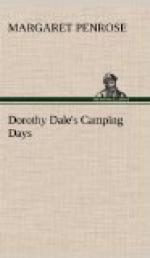Dorothy stood and looked down. It was a very steep descent, and the bottom, a black sheet of water, that looked like ink.
The danger of the spot seemed to fascinate her. Then the thought that perhaps poor, wilful Tavia had fallen down such a place; that perhaps at that very moment, she lay alone, helpless, at the bottom of a cliff!
“But there is a road down there,” Dorothy mused. “I never would have thought to find a roadway along those rocks. Even the Indians, who very likely, made most of these trails, might easily have found a better and safer road to and from the same woodland ways.”
Then she remembered that the lumbermen had use of streams in their traffic, and she decided that this was one of the roads made for their log teams.
Still fascinated with the danger, she looked over again. A sudden dizziness seized her. She tried to step back, but the ledge seemed to crumble beneath her feet!
Staring wildly at the black water below, she was pitched forward—down, down, down!
Then she thought the water would save her; that it was not rough and sharp like the rocks! She thought she would rest awhile on that soft bed! After that she ceased to think!
Dorothy Dale lay there alone, unconscious!
Trundling along the narrow roadway, old Josiah Hobbs and his wife, Samanthy, rode in their farm wagon. They had been to town with berries and in the back of the covered vehicle the empty crates told quite as plainly as the contented smile on the wrinkled faces of the couple, that berries were in demand that morning, and that the Hobbs’ kind had met a ready market.
Near the elbow in the lower road, at the foot of the precipice, where lay so still the form of pretty Dorothy Dale, the old horse slowed up. Mrs. Hobbs saw the girl lying by the water’s edge.
“Mercy on us, Josiah!” she cried. “It’s a girl!”
“Sure as you live!” replied the old man, giving the reins a jerk. “What can have happened to the little one?”
“Pray to goodness she ain’t dead!” went on Samanthy. “Let me get to her!” and before her husband could straighten his cramped limbs, she had crawled out, and was beside Dorothy.
“Is she?” asked Josiah, hesitating.
“She is,” replied the wife. The pair seemed to define each other’s meaning in spite of the vagueness of their words.
“But she’s awful weakish,” whispered the wife. “We got to get her somewhere.”
“Samanthy!” and the farmer’s voice trembled, “mebby she the gal from the asylum! She that escaped! Let’s load her up on the cart and fetch her home.”
“You old skinflint! To cal’late on the half-dead girl,” and she raised Dorothy’s head tenderly. “But all the same she got to get somewhere, and ours is as near as any other house. Here, take hold,” she put her arms about the helpless form. “Mercy on us! Lucky if she don’t die before we get her there. Make that horse know he’s to go. If that whip won’t do, yank up a tree and let him have it.”




